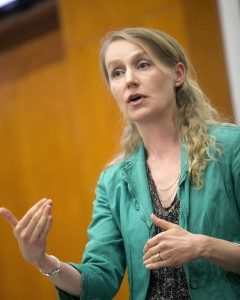Leading Scholar in Local Government and Land Use Law Michelle Wilde Anderson Joins Stanford Law School Faculty
STANFORD, Calif., May 28, 2014—Stanford Law School today announced that local government and land use law expert Michelle Wilde Anderson, currently an assistant professor of law at Berkeley Law School, will join the Stanford Law School faculty as professor of law, effective summer 2014.

Anderson’s teaching, scholarship, and policy work focus on law and government at the local and state level. Her current research focuses on legal restructuring (such as bankruptcy, disincorporation, and receiverships) and state oversight tools for cities and counties facing fiscal crisis—issues that affect not only Rust Belt capitals like Detroit, but also post-industrial cities in California, rural areas in Oregon, and small towns across the Northeast and South. She also writes extensively about the local governance of high poverty areas, both urban and rural.
“Michelle Anderson is a spectacular addition to our faculty. She is a life-changing teacher to her students, and a natural institutional leader. Her scholarship displays a rare combination of creativity and meticulous attention to on-the-ground reality. That combination assures that her work will make a lasting contribution to our understanding,” said M. Elizabeth Magill, Dean and Richard E. Lang Professor at Stanford Law School. “We are thrilled to call her a member of the SLS faculty.”
Anderson offers expertise in the fields of urban policy and city planning. She earned a master’s degree at the London School of Economics and Political Science and worked at the European Commission’s Urban Policy Unit in Brussels.
“Michelle’s work on the legal causes of uneven urban development and urban crisis is first rate and utterly unique. She is the leading scholar looking at those left behind,” said Richard Thompson Ford, George E. Osborne Professor of Law. “Michelle is intellectually intrepid: she combines sharp legal analysis with an ace reporter’s eye for the details of the human experience (and a reporter’s mastery of clear, evocative prose)– she digs deep and also far and wide to find out everything there is to know about new and complex topics, asking and answering important questions most of us didn’t know enough to even ask.”
Anderson’s recent publications include “The New Minimal Cities,” Yale Law Journal (2014); “Detroit: What a city owes its residents,” Los Angeles Times (2013); “Sprawl’s Shepherd: The Rural County” in the California Law Review (2012); “Dissolving Cities,” Yale Law Journal (2012); “Mapped Out of Local Democracy” in the Stanford Law Review (2010); and “Cities Inside Out: Race, Poverty, and Exclusion at the Urban Fringe” in the UCLA Law Review (2008).
“It is an honor and an opportunity to join the Stanford faculty,” said Anderson. “The interdisciplinary centers on campus related to race and poverty, the world-class clinical program at the law school, and the strong commitment to students and teaching are tremendous assets. Add to that the deep bench of faculty role models who engage in policymaking and public writing, and I am quite excited to learn and grow within the Stanford community.”
More on Michelle Wilde Anderson
Prior to her faculty appointment at Stanford Law School, Anderson was a member of the Boalt Law faculty (2008-present) and served on the executive committee of the Thelton E. Henderson Center for Social Justice. She worked as an Environmental Law Fellow at Shute, Mihaly & Weinberger (2006-2008) and clerked for the Honorable Guido Calabresi on the U.S. Court of Appeals for the Second Circuit (2005-2006) and for the Honorable Marilyn Hall Patel of the U.S. District Court for the Northern District of California.
She holds a BA (1997) from Yale University, a M.Sc (2000) from the London School of Economics and Political Science and a JD (2004) from Berkeley Law School.
About Stanford Law School
Stanford Law School is one of the nation’s leading institutions for legal scholarship and education. Its alumni are among the most influential decision makers in law, politics, business, and high technology. Faculty members argue before the Supreme Court, testify before Congress, produce outstanding legal scholarship and empirical analysis, and contribute regularly to the nation’s press as legal and policy experts. Stanford Law School has established a new model for legal education that provides rigorous interdisciplinary training, hands-on experience, global perspective, and focus on public service, spearheading amovement for change.
